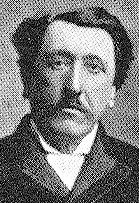 Hymnwriter William Chatterton Dix was born today in Bristol in 1837. His middle name comes from the young and somewhat notorious poet Thomas Chatterton, about whom Dix's father had written a biography.
Hymnwriter William Chatterton Dix was born today in Bristol in 1837. His middle name comes from the young and somewhat notorious poet Thomas Chatterton, about whom Dix's father had written a biography.His career was not in the church; for most of his life he worked for a maritime insurance company in Glasgow. But hymnody was a lifelong interest; his first collection, Hymns of Love and Joy, was published in 1861, and he submitted texts to most of the major English hymnals of the day. We have already seen one of his most popular hymns, Alleluia! sing to Jesus!, which was written "to assist in supplying a then-acknowledged lack of Eucharistic hymns in Church of England hymnody," according to Julian's Dictionary of Hymnology. Dix also translated many hymn texts from Greek and Abyssinian, though these are not as well known today.
When he was 29 he suffered a serious illness which left him bedridden for several months and, as a consequence, depressed. Several of his hymns were written during this time, including this one.
“Come unto me, ye weary,
And I will give you rest.”
O blessèd voice of Jesus,
Which comes to hearts oppressed!
It tells of benediction,
Of pardon, grace and peace,
Of joy that has no ending,
Of love which cannot cease.
“Come unto me, ye wanderers,
And I will give you light.”
O loving voice of Jesus,
Which comes to cheer the night!
Our hearts are filled with sadness,
And we had lost our way;
But Christ has brought us gladness
And songs at break of day.
“Come unto me, ye fainting,
And I will give you life.”
O cheering voice of Jesus,
Which comes to aid our strife!
Our foes are stern and eager,
Our conflict fierce and long;
But Christ has made us mighty
And stronger than the strong
“Whoever comes to hear me
I never will cast out.”
O welcome voice of Jesus,
Which drives away our doubt,
Which calls us, weary travelers,
Unready though we be
To love so free and boundless,
To come, O Christ, to thee.
William Chatterton Dix, 1867; alt.
Tune: BENTLEY (7.6.7.6.D.)
John Pyke Hullah, 1867
This hymn was much more familiar in Dix's lifetime, but a similar text by Horatius Bonar, I heard the voice of Jesus say, is more often published in hymnals in our time. I think they're both worthwhile.
One Year Ago: Harriet Beecher Stowe
No comments:
Post a Comment